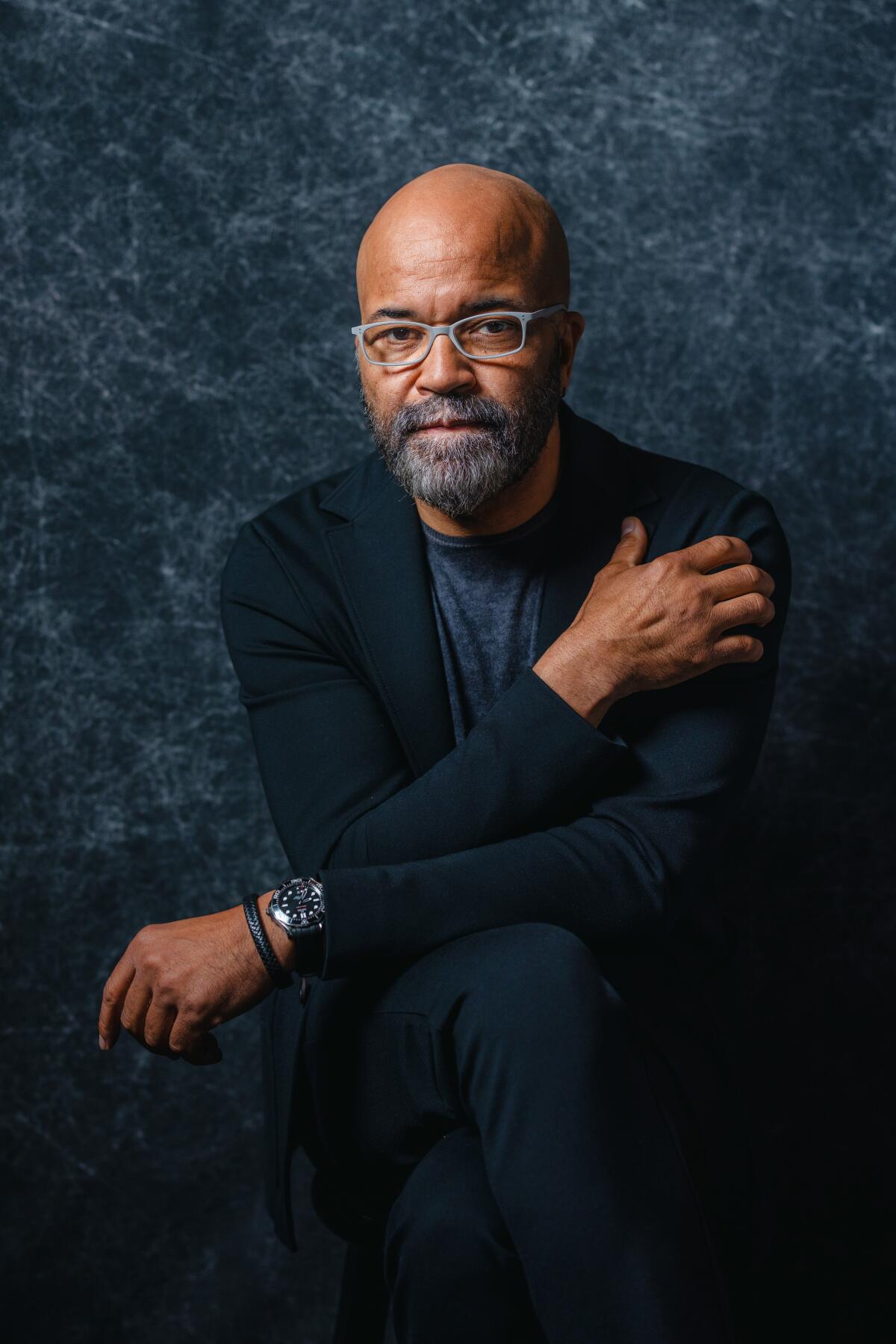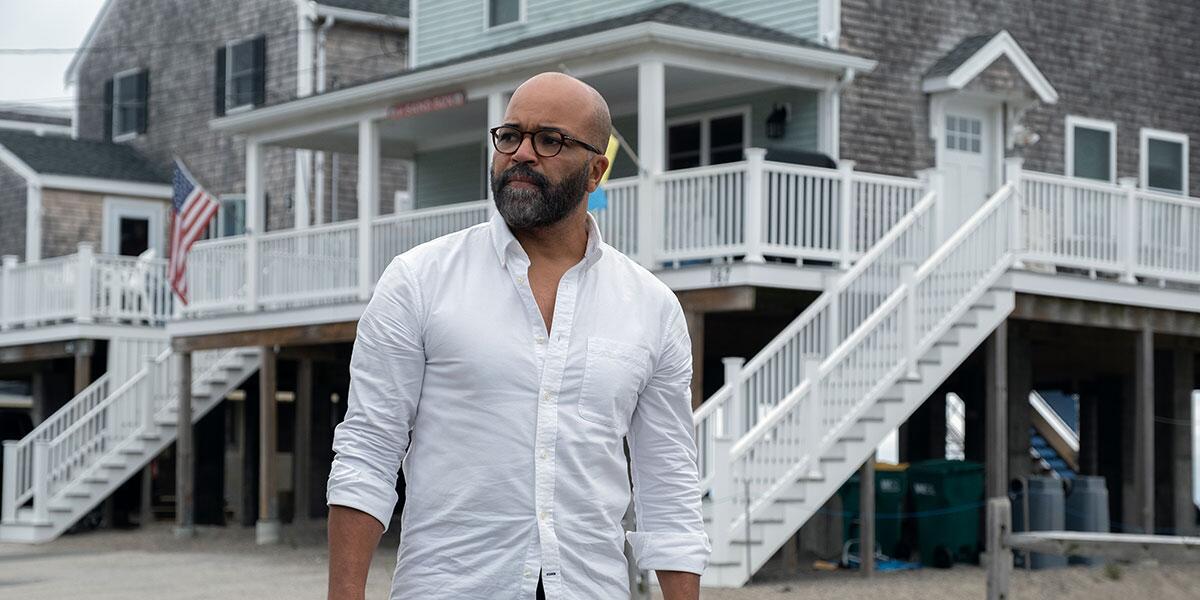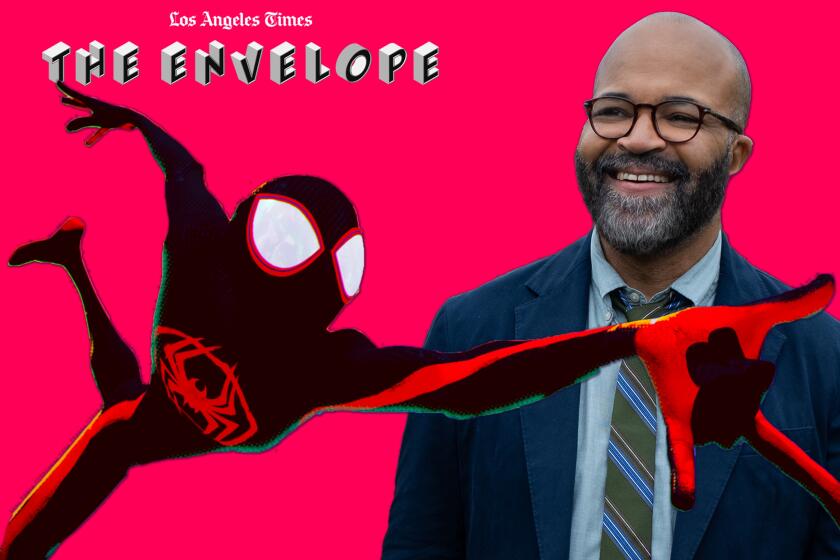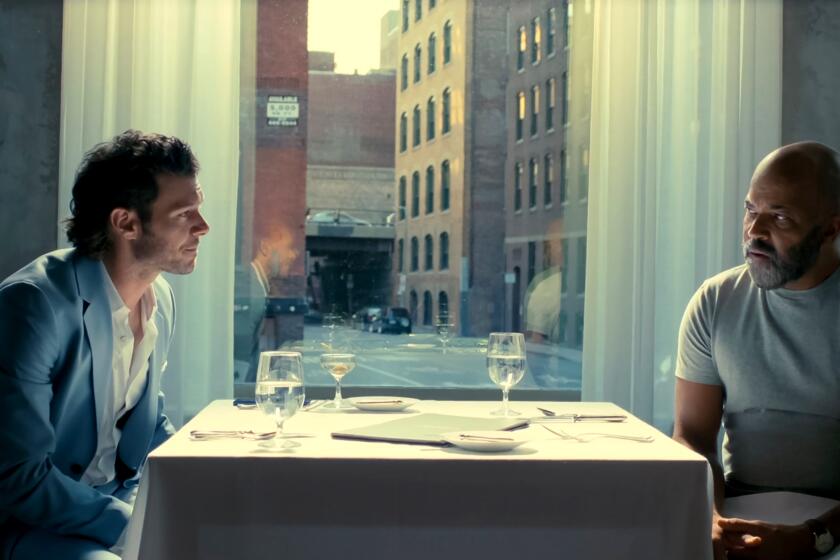‘I try to be who I am’: Jeffrey Wright on his first Oscar nod for ‘American Fiction’

- Share via
Long a stalwart supporting player and something of an actor’s actor, Jeffrey Wright received his first Oscar nomination on Tuesday for his lead performance in “American Fiction.” The film also received nominations for best picture, adapted screenplay for writer-director Cord Jefferson, supporting actor for Sterling K. Brown and original score for Laura Karpman.
Based on the 2001 novel “Erasure,” by Percival Everett, the film won the People’s Choice Award when it premiered last September at the Toronto International Film Festival, often an indicator of future Oscar success. Wright was also nominated for a Gotham Award, a Golden Globe, a Spirit Award and a SAG Award.
In the nimble satire, Wright plays Thelonious “Monk” Ellison, a professor and writer who has been told his work is not “Black enough.” While figuring out how to care for his mother (Leslie Uggams), who has Alzheimer’s disease, his beloved sister Lisa (Tracee Ellis Ross) dies unexpectedly from a heart attack. Monk and his brother Cliff (Brown) attempt to pick up the pieces of their family’s life. Out of frustration, Monk writes a book under the pseudonym “Stagg R. Leigh” that he intends as a parody of the literary world’s depictions of Black life. Instead, it’s taken at face value and becomes a runaway hit. Monk is left to decide whether to reveal his true self or maintain his masquerade.
Wright previously won a Tony for his performance in “Angels in America” and an Emmy for the same role in HBO’s adaptation of the show. Since his early leading role as artist Jean-Michel Basquiat in 1996’s “Basquiat,” he has gone on to roles in the “Hunger Games” franchise, three of the recent James Bond films, the television series “Westworld” and films such as “The Batman” and Wes Anderson’s “The French Dispatch” and “Asteroid City.”
Wright got on the phone with The Times on Tuesday morning to talk about his Oscar nomination. He was at home in Brooklyn when the announcements were made and, as he put it, “I was up, but not to watch. I decided to keep the television off and the computer, just in case there might be some unexpected sudden damage to the screen depending on the news. I just wandered around my house and kept an eye on the phone.”
Awards columnist Glenn Whipp sounds off on the biggest snubs and surprises of the 2024 Oscar nominations, announced Tuesday in Los Angeles.
This is your first nomination. What does it mean to you?
It’s acknowledgment from my peers and the academy that the work is good. I’m particularly pleased that the film was recognized and Cord’s work and Sterling’s and Laura’s — and really everyone who contributed to this film. The thing that I have come absolutely to adore about making movies is that they are collaborative.
I adore it when the collaboration is with generous, smart, passionate partners. That’s what we had on this film. There was a sense when we were making it that we might be on to something special. So this acknowledgment suggests that maybe we were right. And then, as well, we’re a little film. We shot this in 25 days, 26 because we had an additional day after a few cuts of the film. So this brings greater attention to our film and ideally audiences will respond and come take in the story and be touched by it in the way that we were moved by it when we made it. It’s all good.
In particular, considering you so often play supporting roles, is it more meaningful to you that this nomination has come for a lead role?
Either way. If they’re handing ‘em out, I’ll take it. An Oscar is an Oscar, a nomination is a nomination.

You said that the film felt special even as you were making it. What was it about this project in particular?
Cord Jefferson wrote a script adapted from Percival Everett’s novel “Erasure” that was smart, topical, fluent, ironic in the best ways and funny. And that attracted a group of actors and a crew that had a passion for helping Cord tell this story. As we were working on the film, there was a growing sense among all of us that the work we were doing should be performed with additional care. You could sense from the crew that there was a few degrees more pride in what they were doing and that grew over the course of production.
That happens at times, and it doesn’t always, but when it does and you sense that, it’s telling you that you’re doing it right. And that’s what happened on-set in Boston with this one. It was one of the most enjoyable times that I’ve had working on a film, so much so that it kind of made me love Boston, which is a bit of a personal miracle for me.
Why do you think audiences have responded as strongly as they have?
I think audiences have an appetite for story-driven films. We haven’t had as many as we once did make it to cinemas. This movie in some ways harkens back to films of one of the golden ages of American cinema, films in the ’70s that were about characters and story and done in ways that probed current trends and interests in society — and in a way that was buoyant. Our film is funny, but at the same time, there’s a deep thread of emotion that runs through it. And I think all of that lends it an accessibility and it lends the content of the film, conversations around race and identity and representation, a greater palatability. So there’s just a wonderful stew that we were able to cook up, it was a recipe that seems to work.
This week, we break down the Golden Globes nominations, discuss the power of Miles Morales with ‘Spider-Verse’ director Kemp Powers, and catch up with Jeffrey Wright.
As you said, there are comments in the film about media portrayals of Black life while, at the same time, we’re taking in a family’s story running in parallel. In a way, the movie is in conversation with itself. As a performer, how do you approach the multiple levels of some of those scenes?
For me, it was entirely organic. There was no disparity between one side, if you will, of the film and another. They each blended together and had a kind of symbiotic relationship to one another. The absurdity of Monk’s dual life is tied to the ordinary humanness of his family life, because it is to some degree born of the necessity of the responsibilities to family. So these are not two stories that exist on parallel tracks. They’re intimately connected. And there’s a fluidity to it that was really plain on the page, and I just played that.
You’ve talked about how you felt a personal connection to parts of Monk’s story because of things you’ve gone through with your own family. Do you bring that personal stuff into your performance?
First it tied me to the character and to the narrative on an intimate, emotional level. But what I think I didn’t realize is the extent that it was working, maybe subconsciously as well. It’s been a powerful self-reflective experience. Less so in working on the film, more so now that the film has been released and I’ve come to understand through audience reaction to it what it means for them and also more so what it means for me. We have a strange detachment from the audience when we work on films, and it’s not until they receive it that the story is really brought home. And so I think yes, there was an understanding of Monk’s condition that came from my own experiences. But what I was able to feed into that in telling the story was more even than I was aware of while doing it.
Because it’s a film about a man and his relationship to love — to love of the other, love of self, love of family. It’s also a meditation on grief and loss and frustration and the potential for emergence out of all of that. So there’s a deep emotional and psychological well inside this story. And I’m appreciating that more every day as I consider my familiarity with this character.
Monk is frustrated with questions over whether his work is “Black enough.” Is that something that also resonated for you?
Over the course of my life, I’ve been confronted with various perspectives about who I am, how I fit inside the cultural parameters that we live within, sure. I understand those external pressures and those external perceptions or misperceptions. I try to be who I am regardless, my authentic self, which is Monk’s challenge. I can’t live my life based on other people’s ideas of who I am. None of us can. And as an actor and a creative person, one of the primary responsibilities is to discover and express one’s authentic voice. And I’ve tried to do that. I don’t choose my work always out of purely creative urges. Sometimes there are pragmatic urges that relate to responsibility to family. But I have, over time, found comfort inside my skin and inside my voice.
Starring Jeffrey Wright as a frustrated academic and novelist who decides to secretly play the game and write a “Black book,” it’s a welcome dose of smarts.
I’ve heard you say that you think the film is funny but you don’t think it’s a comedy. What’s the distinction for you?
I think it’s tragedy disguised as comedy, tragedy masquerading as comedy, in that the satire is in response to tragic idiocy and absurdity that is better responded to with humor than pure anger. And there is an undercurrent of grief and crisis inside the film that is born of tragic circumstances. So we’re laughing to keep from crying, from straight out of the gate.
Having seen Cord Jefferson giving interviews and promoting the movie, did you base your performance of Monk at all on Cord himself?
No. What does Sammy Davis Jr. say? Sometimes I just gotta be me. I read the script. I read the novel, parts of it early on and then later in the process. But the primary source material, in some ways, was the book of my own life. And that’s fortunate and unfortunate.
You’re such a prolific actor, you seem to always be working. This past year with the actors strike, did that become a time to reflect?
That was time well used, I have to say. I needed a bit of a break. And so that was a time for self-reflection, a bit of decompression and rejuvenation.
Did you come to any new conclusions? What did you learn?
The work continues.
More to Read
Only good movies
Get the Indie Focus newsletter, Mark Olsen's weekly guide to the world of cinema.
You may occasionally receive promotional content from the Los Angeles Times.














